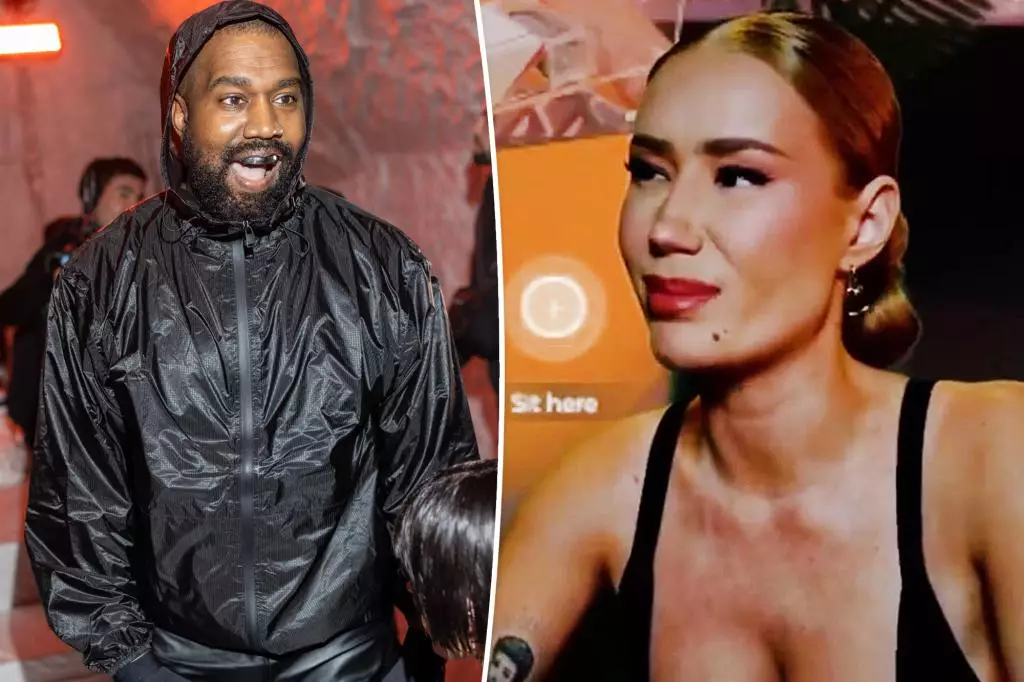In the whirlwind world of celebrity encounters, what happens behind closed doors can be startling. Iggy Azalea, the Australian rapper known for her hit “Fancy,” recently unveiled an unsettling encounter with rapper Kanye West—now known as Ye—that left fans perplexed and questioning the decorum of such high-profile figures. During a live stream, Azalea recounted a bizarre meeting in 2012, where the seemingly genius Kanye presented a “mood board” filled with images that struck a disconcerting chord with her. In an industry that often blurs the lines of professionalism, such incidents raise eyebrows, leaving admirers rattled and confused.
The incident showcased a troubling juxtaposition; a young artist’s admiration for a musical icon met with a shocking breach of personal boundaries. Azalea noted that the photos included in West’s presentation were of her—not as an artist but as an object of fascination. Azalea tried to frame the moment in a light-hearted manner, stating she found it “interesting” that someone she idolized may draw inspiration from her images. Yet, this sentiment soon tilted sharply into discomfort when Kanye bluntly declared, “Yeah, I jack off to them!” Such a crass statement not only objectified Azalea but also emphasized the darker, predatory undertones that sometimes accompany fame.
Conversations That Cross the Line
The encounter escalates with Kanye’s inappropriate inquiries about Azalea’s personal relationships, particularly his crude question regarding the size of her boyfriend’s anatomy. The rapper followed up with disconcerting advice suggesting that monogamy shouldn’t be a girlfriend’s expectation if her partner possesses a certain endowment. Not only does this reflect a toxic attitude towards relationships, but it also demonstrates a cavalier disregard for women’s autonomy and feelings within the confines of a supposedly professional dialogue.
As a society, we often treat celebrities as untouchable figures celebrated for their talents, inadvertently excusing their questionable behavior. Azalea’s experience is a sobering reminder that such interactions are more common than one might think, and they can come at the cost of a woman’s dignity and comfort. The essential question remains: why is it acceptable for powerful men to disregard the emotional landscapes of women in the industry?
The Ripple Effects of Fame
Kanye’s blatant affirmation of his inappropriate comments on social media generated a wave of backlash and renewed discussions about the toxic nature of celebrity culture. In a bizarre tweet, he validated Azalea’s recounting of the incident with a simple, dismissive acknowledgment—all while casually wielding a shrugging emoji. This attitude exemplifies the broader issue of how women’s experiences are frequently minimized or ignored if they conflict with the narratives of famous men.
Furthermore, recent exchanges on social media highlight deeper implications. Azalea criticized West’s implications about her son, Onyx—an innocent child caught in the crossfire of celebrity disputes beyond his comprehension. The emotional toll this takes cannot be understated. In a world where public figures often engage in a spectacle for clicks and views, the souls of their families are left to deal with the aftermath—a reality frequently overlooked in the glitz and glamour of Hollywood.
Azalea’s candid remarks about West’s behavior echo the sentiments of many women in the industry. With powerful men often unchallenged, there’s a pressing need for accountability that goes beyond the superficial. The digital footprints left behind by these interactions create an uncharted territory for their children, potentially crafting a narrative of shame and discomfort that can follow them through life. Azalea articulately desires peace for her son in an era where personal matters frequently fuel public interest.
Breaking the Cycle of Silence
The collective responsibility we hold as consumers of celebrity culture should push us to examine how we celebrate and idolize individuals who engage in unacceptable behavior. Rather than letting their talent overshadow their transgressions, we should champion those who bravely share their experiences, creating an environment where respect and sensitivity are paramount.
As the conversation around celebrity culture evolves, Azalea’s account is but one example of a larger systemic issue. It challenges us to dismantle the glamorization of toxic behavior, urging industry leaders and fans alike to redefine what constitutes admirable conduct. In doing so, we may foster a safer, more empowered community for both artists and their supporters, paving the way for a future where mutual respect reigns supreme.

Leave a Reply